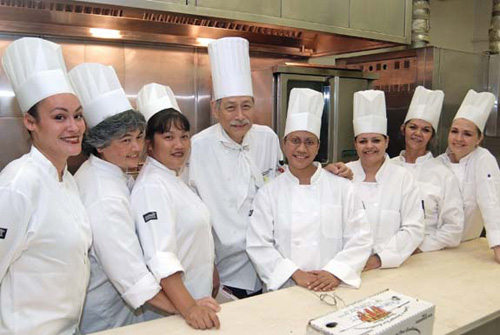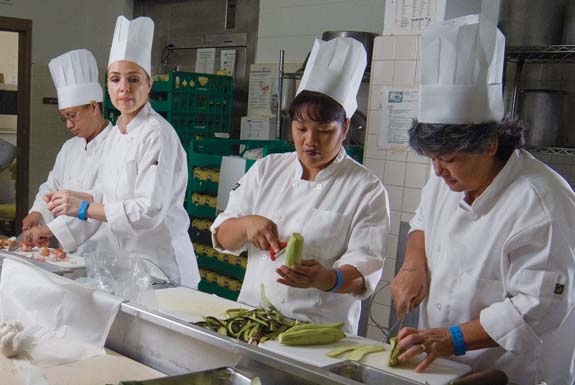Culinary Rehab
September 21st, 2008 | by Kristen Bonilla | Published in Features, Sept. 2008 | 1 Comment

Chef Instructor Yolan Garrett Chan with students, from left, Jennifer Kong-Guillermo, Dana Hasegawa, Jorelyn Pacariem, Cherie Hoewaa-Hubin, Michel'le Canon, Carol Ann Nakamura and Tawny Okemura. Photos by Michael O'Hara
- Related story: Maui academy dishes up boot camp
Cooking can provide stress relief—slicing, dicing, sautéing, braising…a catharsis of sorts, a rehabilitation of mind and body. It’s rehabilitation of a different kind for a group of inmates at the Women’s Community Correctional Center in Kailua.
Getting involved with the wrong people and bad situations landed them here. Now a partnership between the Hawaiʻi State Department of Public Safety and Kapiʻolani Community College’s Culinary Arts Program offers hope that a good life could be within reach.
During spring 2008, seven women made up the inaugural cohort of a pilot training program funded by the Legislature and taught on site by Kapiʻolani chef instructors. The women attended classes, listened to lectures and took exams, just like culinary students on campus, and they can continue at any UH community college once released.
“This class is the best thing that’s happened to me,” says Cherie Hoewaa-Hubin, who’s been incarcerated for the past three years. “I got pregnant and married at 17 and never thought I’d go to college. It’s inspired me to go on to get a degree and make a change in my life.”
“We’ve gotten so many requests to bring culinary training to our facilities, especially the women’s facility,” says Maureen Tito, education program manager for the Department of Public Safety. “I really wanted it to be a degree-seeking program that allowed inmates to earn credits. I wanted the women to understand that having a high school diploma or a college degree is their ticket out.”

Female inmates learn the fundamentals of cookery
WCCC inmates have access to courses from practical (such as parenting, computers and landscaping) to creative (ʻukulele, creative writing) to preparation for the General Educational Development exam. In the new culinary training program, however, women actually earn college credit.
Fundamentals of Cookery, one of first two courses, was held three days a week, six hours a day. The women learned culinary terms, ingredients, cooking methods and proper use of recipes, tools and equipment, with special emphasis on knife handling skills. They came to class in white chef’s jackets and hats, uniforms obtained for them by the facility’s staff, who have gone out of their way to help provide this program, Tito says.
The learning laboratory is the correctional facility kitchen—not exactly the kitchen stadium of Iron Chef fame, much less a cooking school or commercial catering kitchen. The women don’t seem to notice. As they practice hands-on skills, slicing eggplant and dicing shallots, it’s easy to miss the metal cords that anchor knives to the work counters and the watchful security guard at the desk next to the door.
“Every day is a challenge,” says Instructor Yolan Garrett Chan, formerly an executive chef for Continental Airlines and Gros Bonnet Culinary Academy instructor. “You forget that the rules are different here.” Used to shouting or patting students on the back for a job well done, Chan had to change his approach. “You have to treat each one of them differently and be sensitive to their situations and their personalities.”
“We love him,” says student Tawny Okemura, who plans to return home to the Big Island upon her release, continue classes at Hawaiʻi Community College and eventually open her own restaurant. “When you’re in here, you really need someone to believe in you. He cares about us, and the feeling is indescribable. He really makes you feel like you can accomplish something.”
Student Dana Hasegawa is thinking of becoming a nutritionist. “My in-laws run a care home and I could help them know what would be best for the patients. What we’re learning applies to everyday life and really makes you want to put your heart into it,” she says. “Participating in this class makes us feel like we’re not in prison,” adds Jennifer Kong-Guillermo.
For their final project, an end-of-semester celebration, students created and served a three-course lunch to more than 30 VIP guests, including prison employees and officials from public safety and Kapiʻolani. The menu: apple bacon spinach salad with raspberry walnut vinaigrette, stuffed chicken breast Florentine with apricot sauce and riso inforanto con le melanzane (that’s rice baked with layered eggplant) and crème brulee for dessert. Not your normal prison food.
“There’s really nothing like it,” says Okemura. “We’re really hoping that this program continues, and maybe even opens up other programs.” While the women waited eagerly to begin an intermediate course this fall, Department of Public Safety officials were so impressed, they funded another introductory course over the summer.
“Our goal is to offer a wide variety of classes, taught by both volunteers and contracted instructors, to assist with the rehabilitation process of inmates and to provide them with a foundation for transitioning back into society,” says McNeil Kamai, education supervisor for the women’s facility. In a National Council on Crime and Delinquency survey, American voters favored rehabilitative services for prisoners by an almost 8–1 margin over a punishment-only system, and 82 percent consider lack of job training a very significant barrier to avoiding subsequent offenses.
“Culinary is one of the best career tracks for ex-offenders, especially in Hawaiʻi where there will always be a demand for workers,” says Tito. “You have to like it, you have to be creative, and I think the industry really recognizes them for what they can do and what they are capable of.”
“We’re all good people, we just made some wrong choices,” says student Michel’le Canon, who plans to pursue a degree at Kapiʻolani upon release this fall. “One day, you’ll see us cooking in a restaurant. If you believe in yourself, anything is possible,” she says.
“Everyone should have a second chance,” says Chan. Isn’t that what rehabilitation is all about?
Maui academy dishes up boot camp
A successful culinary boot camp for Maui Community Correctional Center inmates in June 2008 has Maui Community College exploring a new training partnership. The weeklong boot camp brought 11 inmates and 2 former inmates to the college’s Paʻina culinary facility on the Kahului campus—the first such program outside of prison walls.
“The student inmates were ecstatic with the state-of-the-art kitchen facilities,” says Maui Culinary Academy Chef Dean Louie. The crash course covered all things cooking.
Inmates created and served quality restaurant lunches for a weekly Rotary Club of Maui meeting and a graduation event at the academy’s Leis Family Class Act restaurant. The menu included escargot in shallot butter in a potato
shell, bay shrimp canapé with goat cheese, poached mahimahi with Dijon mustard sauce and carved roast strip loin with mushroom sauce and horseradish cream.
Not bad for three short days of kitchen training, says Louie.
The program was sponsored by Maui Economic Opportunity’s BEST (Being Empowered and Safe Together) reintegration program. Academy officials hope to develop an ongoing presence, helping reduce recidivism through vocational programs that develop confidence.
“The tremendous feeling of pride, self-confidence and achievement was poignant on the last day,” says Louie. Students were eager to learn, attentive and made good decisions, if permitted, he adds. “My greatest hope would be to see my students apply their knowledge, share their skills and continue their education in every capacity.”
Stars behind bars
University of Hawaiʻi Astronomer Bob Joseph teaches a noncredit astronomy course to inmates through the Women’s Community Correctional Center’s Total Life Recovery program. Read his account in the Institute for Astronomy’s Nā Kilo Hōkū newsletter.
Tags: culinary, Culinary Institute of the Pacific, Hawaii Community College, Kapiolani Community College, Maui Community College, vocational, Vol. 33 No. 3

January 4th, 2009at 9:11 pm(#)
It’s a wonderful program, I have continued my edjucation
on the out’s at K.C.C were i have furthered my schooling
in the culinary arts, and i have to tell you its been wonderful, thanks to chef Yolan Garret Chan And K.C.C
For the oppertunity, and giving the inmates at W.C.C.C
a second chance to better their lives with this program.